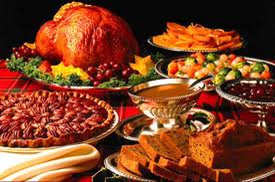 Are you an “Occasional Quantity Cook”? Are you the person who organizes the chili dinner at church, concessions for the school booster club, or even a huge family reunion? If you answered “yes” to one of more of those questions, then you are an “Occasional Quantity Cook”. While Occasional Quantity Cooks (or OQC) are typically organized and often really good cooks, there are a few other important messages that OQC need to keep in mind when planning events. These messages will help us reduce the 48 million cases of foodborne illness each year that one in six of us will get:
Are you an “Occasional Quantity Cook”? Are you the person who organizes the chili dinner at church, concessions for the school booster club, or even a huge family reunion? If you answered “yes” to one of more of those questions, then you are an “Occasional Quantity Cook”. While Occasional Quantity Cooks (or OQC) are typically organized and often really good cooks, there are a few other important messages that OQC need to keep in mind when planning events. These messages will help us reduce the 48 million cases of foodborne illness each year that one in six of us will get:
• The pathogens that cause foodborne illness will grow to harmful levels if given “Time”. The message is: don’t leave food at room temperature for more than 2 hours, 1 hour if it is over 90 degrees.
• “Temperature” is important because most pathogens grow best between 40 and 140 degrees – so keep hot foods hot and cold foods cold.
• “Cross Contamination” happens when bacteria is transferred from one person, object, or place to another. It can happen when raw meats come into contact with other foods in a shopping cart or the refrigerator; or when those same meats contact a surface during preparation (an example is using the same cutting board for raw meats and then lettuce in a salad.
• Another important factor in food safety is “Personal Hygiene” – clean hands and clothing, hair restrained, and not smoking or touching pets. If you are having an event with money, assign someone different to take the money than the people who handle the food.
• “Sanitizing” is also important when you are an Occasional Quantity Cook. After surfaces and equipment are cleaned (soap and warm water), then a sanitizing solution of 1 tablespoon household bleach (unscented) to 1 gallon room temperature water should be used. Use this solution on work surfaces, tabletops, utensils, and dishes to reduce the number of microorganisms to safe levels.
If you have had a food event and have left-overs, don’t forget to divide foods into smaller quantities that can be cooled down quickly. Use food-grade containers to store and place in cold food storage with plenty of room for air to circulate all around the container (never stack hot food containers that you want cooled).
As an Occasional Quantity Cook you can learn more about food safety by taking a food safety course offered by Ohio State University Extension, Family and Consumer Sciences Educators. Tips to help you plan and hold your food event will be covered and you can ensure your event is “Food Safe”!
Sources:
Occasional Quantity Cooks, Linnette Goard and Kate Shumaker, Ohio State University Extension.
Minnesota Department of Health, http://www.health.state.mn.us/foodsafety/clean/xcontamination.html.
Written by: Lisa Barlage, Extension Educator, Family and Consumer Sciences, Ohio State University Extension, Ross County.
Reviewed by: Linnette Goard, Field Specialist, Food Safety, Selection and Management, Family and Consumer Sciences, Ohio State University Extension.

